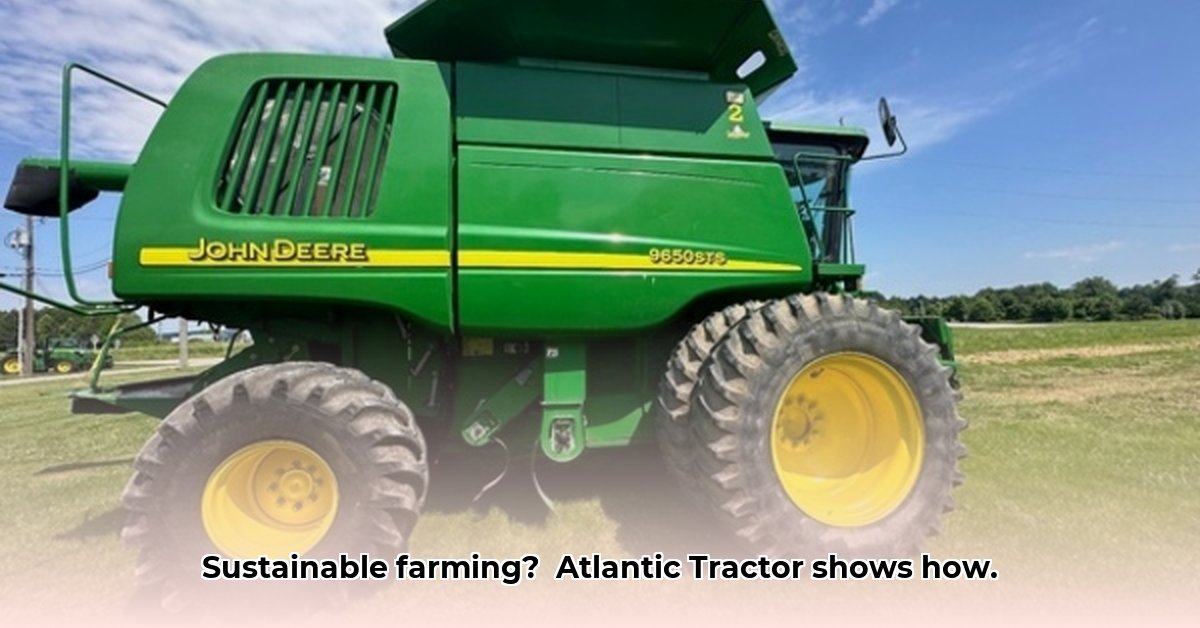
Atlantic Tractor Queen Anne: A Partner in Sustainable Farming
Atlantic Tractor Queen Anne, serving farmers across Maryland, Delaware, and Pennsylvania, is more than just an equipment supplier; it's a vital partner in the agricultural community. Providing a wide range of equipment, parts, service, and financing, they help farmers keep their operations running smoothly. But with the increasing urgency of sustainable farming practices, how can Atlantic Tractor Queen Anne further its role in shaping a greener future for agriculture? This article explores how they can become instrumental in environmentally friendly and profitable farming practices. For more on large-scale equipment distribution, see this related resource.
More Than Just Tractors: Meeting the Demands of Modern Sustainable Farming
Atlantic Tractor Queen Anne currently offers diverse equipment from leading brands like John Deere, Honda, and Frontier – everything from compact utility tractors for landscaping to large-scale machinery for row-crop farming. However, modern farming demands more than just powerful machines; reliability and efficiency are paramount. Downtime is incredibly costly, and equipment maintenance represents significant expenditure. Atlantic Tractor's robust service and parts departments directly address these needs, ensuring farmers maximize operational uptime and minimize disruptions. This reliability is particularly crucial for sustainable agriculture, where efficient resource utilization is key.
Growing Towards a Greener Future: Opportunities for Atlantic Tractor
Sustainability in agriculture is no longer a trend, it's a necessity. Farmers are actively seeking ways to minimize their environmental footprint, and Atlantic Tractor Queen Anne is uniquely positioned to assist. Several key opportunities exist to significantly enhance their contribution to sustainable practices:
Precision Farming: Optimizing Resource Use
Precision agriculture, utilizing GPS-guided machinery and variable-rate technology, optimizes resource allocation. Imagine applying fertilizer only where it's needed, rather than across the entire field. This targeted approach drastically reduces waste, minimizes harm from excess chemicals, and significantly improves profitability. It's about maximizing yields while minimizing environmental impact. The technology is readily available; it's now critical to educate farmers on its effective application and seamless integration into existing operations. Isn't this a perfect example of smart farming?
Alternative Power Sources: Embracing a Cleaner Future
Electric and alternative fuel tractors represent a considerable leap towards lower carbon emissions compared to traditional diesel models. While initial investment costs may be higher, the long-term savings in fuel costs and reduced emissions promise a substantial return. This presents significant growth potential, though challenges remain. Developing supporting infrastructure for charging electric equipment and ensuring consistent alternative fuel availability require careful planning and strategic partnerships. Given the escalating concerns about climate change, what are the long-term repercussions of NOT embracing alternative energy sources?
Strategic Partnerships: Expanding Sustainable Solutions
Collaborating with manufacturers specializing in sustainable equipment is crucial for Atlantic Tractor. Such partnerships unlock access to cutting-edge technologies, diversify product offerings, and provide innovative solutions. It's not merely about selling equipment; it's about building a network dedicated to sustainable solutions. This collaborative approach allows Atlantic Tractor to provide farmers with a wider choice of equipment and maintain their competitive edge in a rapidly changing market. How can strategic partnerships accelerate the adoption of sustainable technologies? This is a crucial question for all stakeholders involved.
Farmer Education: Empowering Sustainable Practices
Atlantic Tractor can play a leading role in educating farmers about sustainable practices and the appropriate equipment to support them. Workshops, training sessions, and informational materials are invaluable tools. This support isn't just good business; it's essential for broader adoption of sustainable farming practices, helping empower farmers to make informed decisions leading to both environmentally friendly and economically viable operations. What’s the ROI of investing in farmer education? The answer might surprise you.
A Roadmap for Success: Actionable Steps for a Greener Future
To effectively embrace sustainability, Atlantic Tractor Queen Anne requires a comprehensive and multi-faceted strategy. The short-term and long-term goals are outlined below:
Short-Term Goals (0-1 year):
- Staff Training: Equip staff with knowledge of sustainable technologies and explore available government grants and incentives.
- Farmer Workshops: Launch workshops on efficient equipment use and sustainable farming techniques for existing and prospective clients.
- Partnership Exploration: Begin investigating partnerships with manufacturers of sustainable agricultural equipment.
Long-Term Goals (3-5 years):
- Comprehensive Sustainability Plan: Develop a detailed sustainability plan with quantifiable carbon reduction targets and investment in green infrastructure.
- Advanced Staff Training: Invest in comprehensive training for staff on precision agriculture technologies and alternative energy equipment.
- Community Engagement: Collaborate with local agricultural organizations and government agencies to promote and support sustainable farming practices.
Navigating Risks and Rewards: A Balanced Approach
While the benefits of sustainable practices are undeniable, potential risks demand careful consideration:
| Technology/Initiative | Potential Risks | Potential Benefits |
|---|---|---|
| Electric/Alternative Fuel Equipment | High upfront costs; limited charging infrastructure; potential supply chain disruptions | Lower operating costs; reduced emissions; reduced reliance on fossil fuels |
| Precision Agriculture | Data management complexity; initial investment in technology; integration challenges with existing systems | Increased efficiency; precise resource management; reduced environmental impacts |
| Partnerships with Sustainable Equipment Suppliers | Supplier reliability; potential supply chain disruptions; compatibility issues | Access to innovative, sustainable technologies; diversified product portfolio; enhanced customer offerings |
Conclusion: A Greener Future for Agriculture
Atlantic Tractor Queen Anne is well-positioned to become a leader in sustainable agriculture. By proactively embracing innovation, building strong customer relationships, and actively pursuing strategic partnerships, they can significantly contribute to a more environmentally friendly and economically prosperous future for the Mid-Atlantic farming community. It’s a commitment to both a healthy planet and a thriving business. The transition toward sustainable farming isn't just an environmental imperative; it’s a smart business decision, promising long-term profitability and a positive impact on the environment.